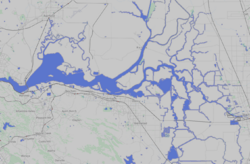Little Hastings Tract facts for kids
| Geography | |
|---|---|
| Location | Northern California |
| Coordinates | 38°15′02″N 121°41′32″W / 38.25056°N 121.69222°W |
| Adjacent bodies of water | Sacramento–San Joaquin River Delta |
| Highest elevation | 0 ft (0 m) |
| Administration | |
|
United States
|
|
| State | |
| County | Solano |
Little Hastings Tract is a small island located in the Sacramento–San Joaquin River Delta in California. It is part of Solano County. The island's exact location is 38°15′02″N 121°41′32″W / 38.25056°N 121.69222°W. In 1981, the United States Geological Survey recorded its elevation as 0 ft (0 m). This means the island is at sea level, or even slightly below it.
Contents
Exploring Little Hastings Tract
Little Hastings Tract is a unique piece of land within the vast Sacramento–San Joaquin River Delta. This area is a huge network of waterways and islands. It plays a vital role in California's water supply.
Where is Little Hastings Tract Located?
This island is found in the northern part of California. Specifically, it's in Solano County. The Delta region is where the Sacramento and San Joaquin rivers meet. They then flow into San Francisco Bay.
The Delta is made up of many islands and "tracts." These are often low-lying areas. They are protected by levees (earth walls) from the surrounding water.
What is a "Tract" in the Delta?
In the Delta, a "tract" often refers to an area of land. This land was once a marsh or shallow water. Over time, people built levees around it. They then drained the water from inside. This created dry land for farming or other uses.
Little Hastings Tract is one such area. Its name suggests it was formed this way. Many Delta islands are below sea level. This makes them special and sometimes challenging places.
The Delta's Importance
The Sacramento–San Joaquin River Delta is very important. It provides drinking water for millions of Californians. It also supports a lot of wildlife. Many different kinds of fish, birds, and plants live here.
Islands like Little Hastings Tract are part of this complex system. They contribute to the Delta's unique environment. They are also part of its history of land reclamation.
Images for kids
 | Selma Burke |
 | Pauline Powell Burns |
 | Frederick J. Brown |
 | Robert Blackburn |




